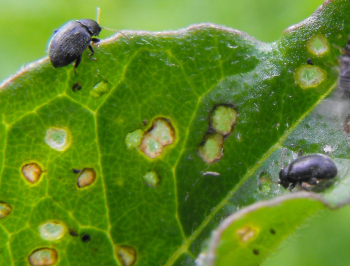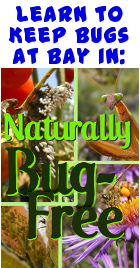
Bad Bug Profile: Flea Beetles
 Flea
beetles are a fact of life here on the farm. If you see tiny
holes speckling your vegetable leaves and little black bugs jumping
off the plants, you're infested.
Flea
beetles are a fact of life here on the farm. If you see tiny
holes speckling your vegetable leaves and little black bugs jumping
off the plants, you're infested.
As with aphids, I tend to take a live and let live approach to flea
beetles. Unless my plants are stressed, flea beetles don't tend
to build up to very serious levels. If I'm feeling aggressive,
I'll sprinkle wood ashes on the leaves, which is supposed to cut down
on flea beetles. I'm not sure I've ever seen a real reduction
after treatment, but on the other hand I've never had a really bad
infestation of flea beetles.
| Species: Potato Flea Beetle (Epitrix cucumeris) Plants Affected: potatoes and tomatoes Related Species: Several other flea beetle species feed on nightshade family plants and cabbage family plants (along with some less common species which hit several other types of plants.) The species which feeds on eggplant is serious bad news! Natural Enemies: Lacewing larvae, Big-eyed Bugs, Two-lined Collops, Western Damsel Bug, and Northern Field Cricket, but most predators aren't present in early spring when flea beetles are a problem. Organic Control: sprinkling wood ashes; no till soil management; floating row covers over eggplants |
 Read other posts about Organic Insect Control: Read other posts about Organic Insect Control: |
Want more in-depth information? Browse through our books.
Or explore more posts by date or by subject.
About us: Anna Hess and Mark Hamilton spent over a decade living self-sufficiently in the mountains of Virginia before moving north to start over from scratch in the foothills of Ohio. They've experimented with permaculture, no-till gardening, trailersteading, home-based microbusinesses and much more, writing about their adventures in both blogs and books.
Want to be notified when new comments are posted on this page? Click on the RSS button after you add a comment to subscribe to the comment feed, or simply check the box beside "email replies to me" while writing your comment.
Add a comment
